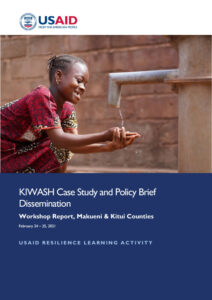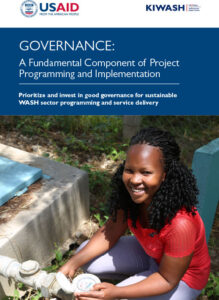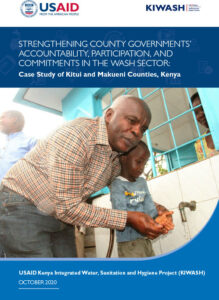Resource Library
Kenya Resilience Learning Hub | A Knowledge Portal for Resilience and Development Practitioners

- Learning Briefs
- February 2021
- SEK
- 0 Downloads
KIWASH Case Study and Policy Brief Dissemination Workshop Report, Makueni & Kitui Counties
In October 2020, the Resilience Learning Activity (RLA) engaged a Learning and Knowledge Management Specialist to support KIWASH in conceptualizing and developing a Case Study on its work around Strengthening County Governments Accountability, Commitment and Participation in the WASH sector. Upon completion of the Case Study and during the post-case study discussions, it emerged that there was a need to further come up with a tool for engaging policy makers in WASH. RLA working with KIWASH therefore further engaged the consultant to lead the development of a Policy Brief.

- Reports & White Papers
- SEK
- 0 Downloads
Prioritize and invest in good governance for sustainable WASH sector programming and service delivery
Forty percent of Kenyans rely on unsafe water from ponds, shallow wells, and rivers. Another 70 percent lack access to basic sanitation. Kenya’s rural and urban slum dwellers are most affected, as they are neither able to connect to piped water nor get access to satisfactory sanitation services.

- Case Studies
- OCTOBER 2020
- SEK
- 0 Downloads
Strengthening County Governments’ Accountability, Participation, and Commitment in the WASH Sector – Case Study of Kitui and Makueni Counties, Kenya
While the population of Kenya is steadily rising – recently being enumerated at over 47 million (Kenya Population and Housing Census 2019) – 40 percent of Kenyans still rely on unimproved water sources such as ponds, shallow wells, and rivers, while 70 percent of Kenyans lack access to basic sanitation solutions. Rural Kenya and urban slums suffer the most, with most people often unable to connect to piped water infrastructure.
